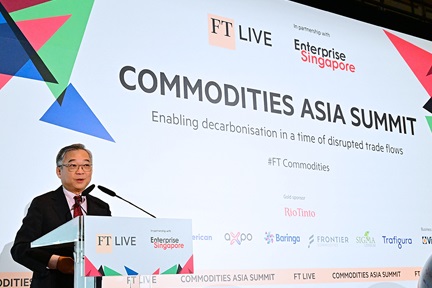Paving the road ahead for future mobility

Artist’s impression of the Hyundai Motor Group Innovation Center in Singapore which is slated to be completed by end-2022. Credit: Hyundai Motor Group
Fancy swing-up car doors? No problem. With a few taps on your phone, you can order and customise a car model to suit your taste, then watch it being assembled in the comfort of your home. This might be a reality soon.
To realise their vision for smart manufacturing and future mobility, the Hyundai Motor Group Innovation Center in Singapore (HMGICS) has tied up with NTU, its first academic research partner under the new facility.
The partnership was inked at a signing ceremony in NTU on 30 Oct 2020 by NTU’s Senior Vice President (Research) Prof Lam Khin Yong and Hyundai Motor Company’s Senior vice president Hong Bum Jung.
The event followed a virtual groundbreaking ceremony of the HMGICS earlier in the month (13 Oct), which was officiated by Singapore Prime Minister Lee Hsien Loong, South Korea’s Industry Minister Sung Yun-mo and Hyundai Motor Group Chairman Euisun Chung.

NTU’s Senior Vice President (Research) Prof Lam Khin Yong (right) and Hyundai Motor Company’s Senior Vice President Hong Bum Jung (left) at the MoU signing ceremony on 30 Oct 2020.
Touted to be the first of its kind in the world, Hyundai’s new seven-storey innovation centre in Jurong is just a stone’s throw away from the NTU Smart Campus, which is a living testbed of innovative digital and tech-enabled solutions.
When completed by end-2022, the R&D team at Hyundai will get easy access to the latest technologies on trial at NTU, such as autonomous vehicles and renewable energy. Likewise, NTU researchers can leverage the open innovation lab at the HMGICS to test out new mobility concepts. For example, the facility will have a landing pad for passenger drones.
“With the NTU smart campus being in such proximity to the innovation centre, it will be easier for our researchers and Hyundai’s engineers to engage in discussions. We look forward to see how this synergy between academia and industry will bring about meaningful results,” says Prof Lam.
One objective of the research partnership is to find ways to enhance the automobile manufacturing platform with ‘smart customising’ functions that would allow customers to tailor make car models to suit their lifestyle and taste.
The research project amplifies Hyundai’s proposition for the centre, which is to create a ‘Human-Centered Value Chain Innovation’. This refers to a philosophy of considering the customer needs at all stages of the car life, from placing the order and production, to test drive and service.

Delegations from the Hyundai Motor Company and Chairs of NTU’s Engineering School at a meeting before the MoU signing ceremony.
And it was NTU’s reputation as a top global university that drew the South Korean carmaker to pick the university as its first research partner.
The university was ranked 2nd to Microsoft by the Nikkei Asian Review in 2017 for being the organisation with most quoted AI-related research papers in the world. It is also no stranger to corporate partnerships, having worked with numerous companies on industry projects such as to test smart mobility systems at its Centre of Excellence for Testing and Research of Autonomous Vehicles – NTU (CETRAN)
“A lot of industry-academic collaboration is happening through corporate labs and joint-labs. Hyundai Motor Group cannot achieve our Group’s vision alone and we will seek out open innovations with Singapore’s leading players. I’m sure that NTU will be the key partner for our innovation,” says Mr Jung, noting NTU’s research capabilities in AI, Big Data, and additive manufacturing.
The collaboration will also benefit both faculty and students, adds Prof Lam.
Researchers will be working directly on industry programmes with real commercial applications, while students get opportunities in cross-disciplinary training through internships and projects, thereby getting equipped with “the confidence necessary to meet the challenges of the future workforce”, he says.






